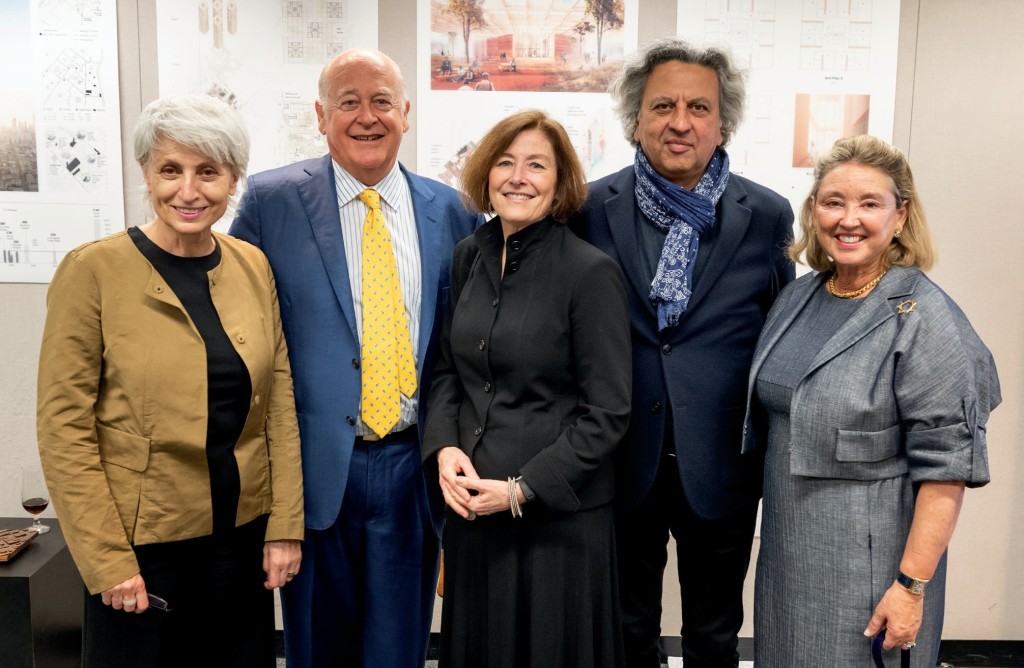In December 2018, a gift from Samuel Plimpton MBA ’77, MArch ’80 and his wife, Wendy Shattuck, established the Plimpton Professorship of Planning and Urban Economics. The professorship will advance the GSD in the field of urban economics, fundamental for understanding the economics of cities, as well as land use, planning, and real estate decisions in urban areas. As the world’s foremost design school, the GSD is a natural home for exploring a range of urban issues and advancing this core field.
The GSD’s curriculum in urban economics will include focuses on the components and measurement of successful urban planning and development projects, including: use mix (retail, market and affordable housing, commercial, institutional); the relationships between land use patterns and property values and other metrics of success; transformations in technology and mobility infrastructures; the interactions of metropolitan-scale markets and regulatory institutions and policy; public finance; and the impacts of climate change on public and private sector decisions.
“Investments in cities and the built environment are the driving engine of growth in local, regional, and national economies here in the U.S., and around the globe,” said Diane Davis, Charles Dyer Norton Professor of Regional Planning and Urbanism. “If we want to create prosperous futures while also contributing to sustainable urbanism, greater attention to the drivers of urban economies should be a number one priority, both for the public and private sectors.”
 Homa Farjadi, Samuel Plimpton MBA ’77, MArch ’80, Diane Davis, Mohsen Mostafavi, and Wendy Shattuck celebrate the establishment of the Plimpton Professorship of Planning and Urban Economics[/caption]
Homa Farjadi, Samuel Plimpton MBA ’77, MArch ’80, Diane Davis, Mohsen Mostafavi, and Wendy Shattuck celebrate the establishment of the Plimpton Professorship of Planning and Urban Economics[/caption]
This position is essential to helping build on the emphasis we’ve always had in the area of economics as it pertains to all aspects of urban growth and development. It sends a powerful message to everyone that the GSD would have such a position, as it amplifies our very long tradition of having scholars who teach urban economics.~ Richard Peiser, Michael D. Spear Professor of Real Estate DevelopmentAs the field of urban economics has evolved in recent years, understanding the cultural context of urban economic growth has become increasingly important. Scholars have examined the role of arts, public space, and leisure activities in place-making, which has inspired new work on how to incorporate these priorities into urban development projects. Along with Davis, Richard Peiser, Michael D. Spear Professor of Real Estate Development, describes the GSD as the perfect environment for synthesizing multiple urban objectives through creative building and urban development projects. “This position is essential to helping build on the emphasis we’ve always had in the area of economics as it pertains to all aspects of urban growth and development,” Peiser said. “It sends a powerful message to everyone that the GSD would have such a position, as it amplifies our very long tradition of having scholars who teach urban economics.” “Plimpton’s long-term loyalty and support of the GSD has been fundamental to the success of the program” Peiser added. “This new position is really central to supporting three of our fundamental teaching disciplines in the Department of Urban Planning and Design: urban planning, economic development, and real estate.” [caption id="attachment_9883" align="aligncenter" width="700"]
 Homa Farjadi, Samuel Plimpton MBA ’77, MArch ’80, Diane Davis, Mohsen Mostafavi, and Wendy Shattuck celebrate the establishment of the Plimpton Professorship of Planning and Urban Economics[/caption]
Homa Farjadi, Samuel Plimpton MBA ’77, MArch ’80, Diane Davis, Mohsen Mostafavi, and Wendy Shattuck celebrate the establishment of the Plimpton Professorship of Planning and Urban Economics[/caption] 